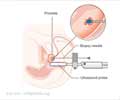Simple blood test can determine the presence of prostate cancer efficiently accurately and helps avoid unnecessary invasive biopsies and treatment.

‘A combination of circulating tumor cells (CTC) and prostate-specific antigen (PSA) test can spot aggressive prostate cancer accurately and could save thousands of men undergoing needless biopsies and treatment.
’
Read More..




When a high PSA level in the blood is detected, the patient undergoes a tissue biopsy of the prostate gland, which is invasive and carries a significant risk of bleeding and infection. On biopsy, the majority of patients with elevated PSA levels are found not to have cancer. Read More..
Additionally, most diagnosed early-stage prostate cancers are not fatal if left untreated. The current practice of the combined PSA test and biopsy for prostate cancer, therefore, results in unnecessary biopsies and over-diagnosis and overtreatment of many men.
The new prostate cancer test (the Parsortix® system from ANGLE plc) detects early cancer cells or circulating tumor cells (CTCs) that have left the original tumor and entered the bloodstream prior to spreading around the body. By measuring intact living cancer cells in the patient’s blood, rather than the PSA protein which may be present in the blood for reasons other than cancer, it potentially provides a more accurate test for prostate cancer.
The study, published in the Journal of Urology, looked at the use of the CTC test in 98 pre-biopsy patients and 155 newly diagnosed prostate cancer patients enrolled at St Bartholomew’s Hospital in London. The research team found that the presence of CTCs in pre-biopsy blood samples were indicative of the presence of aggressive prostate cancer, and efficiently and non-invasively predicted the later outcome of biopsy results.
When the CTC tests were used in combination with the current PSA test, it was able to predict the presence of aggressive prostate cancer in subsequent biopsies with over 90 percent accuracy, better than any previously reported biomarkers.
Advertisement
Lead researcher Professor Yong-Jie Lu from the Queen Mary University of London said: "The current prostate cancer test often leads to unnecessary invasive biopsies and over-diagnosis and overtreatment of many men, causing significant harm to patients and a waste of valuable healthcare resources. There is clearly a need for a better selection of patients to undergo the biopsy procedure.
Advertisement
As this is a single-center study, the results need to be further validated in other independent research centers before the CTC test is available either privately or on the NHS in the UK, which could take a further 3-5 years. Clearance by the US Food and Drug Administration could also take 3-5 years.
This work was funded by Orchid Cancer Appeal, Cancer Research UK, and ANGLE plc (which manufactures the Parsortix system). The funding sources had no role in the design of the study; the collection, analysis, or interpretation of the data; or the writing of the research paper.
Source-Eurekalert










![Prostate Specific Antigen [PSA] Prostate Specific Antigen [PSA]](https://www.medindia.net/images/common/patientinfo/120_100/prostate-specific-antigen.jpg)




